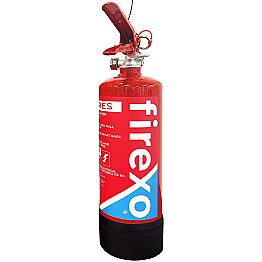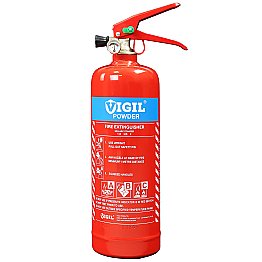- Cable Protectors
- Corner Guards
- Temporary Barriers
- Speed Bumps
- Wheel Stops
- Traffic Mirrors
- Cones and Fencing
- Permanent Barriers
-
Fire Safety
- Fire Safety Equipment
-
Fire Extinguishers
- CO2 Fire Extinguisher
- Dry Powder Extinguishers
- Water Fire Extinguisher
- Water Additive Extinguisher
- Foam Fire Extinguisher
- Lith-Ex Fire Extinguishers
- P50 Self-Service Fire Extinguishers
- Firexo All Fires Extinguishers
- Wet Chemical Extinguisher
- Clean Gas Fire Extinguisher
- Designer Extinguishers
- Automatic Extinguishers
- Launcher Fire Extinguishers
- Wheeled Fire Extinguishers
- Cold Protected Extinguishers
- Home Fire Extinguisher
- Boat Fire Extinguishers
- Fire Extinguisher Packs
- Fire Blankets
- Intumescent Fire Stopping
- Fire Brigade Equipment
- Fire Hose Reels & Spares
- Extinguisher Stands
- Fire Extinguisher Servicing
- Fire Buckets
- Fire Alarms
- Fire Alarm Systems
- Smoke Alarms
- Extinguisher Box
- Fire Wardens
- Fire Exit Security
- STI Vandalism and Theft Stoppers
- Extinguisher Accessories
- Wall Fixing Brackets
- Fixing Brackets
- Extinguisher Trolleys
- Fire Rated Hatches and Boxes
- Fire Safety Servicing
- Home Safety
- Fire Door Holders
- Ladders
- Torches and Lighting
- Electric Car Charging Safety
- Megaphone
- First Aid Kits
- Car Park Equipment
- Personal Protective Equipment
- Masks
- Fire Safety Packs
-
Fire & Safety Signs
- Fire Safety Signs
- Personal Protection Signs
- No Smoking Signs
- Must Do Signs
- Warning Signs
- Hazard Signs
- Sign Fixing
- Panoramic Signs
- Disabled
- Prohibition Signs
- White Plastic Signs
- Table Top Display Signs
- CCTV Signs
- Door Safety Signs
- Safety Tie Labels
- Health & Safety Posters
- Spill Kits
- Cigarette Bins
- Evacuation Chairs
- Fire Safes
- Anti-Fatigue & Safety Mats
- Tapes and Markers
- Emergency Lighting
- Car Safety Accessories
- Flammable Liquids Storage
Fire Extinguishers
Bestsellers
Being equipped with fire extinguishers keeps buildings, people, and environments safe from the dangers of fire. You can stay ahead of fire emergencies by installing the correct extinguisher for your needs to help you effectively fight fires.
The Regulatory Reform (Fire Safety) Order 2005 is applicable across England and Wales. This legislation requires building owners to protect their premises with the correct fire safety equipment, including items such as fire blankets, fire extinguishers, and alarms. This law also extends to landlords in HMO properties.
Understanding Fire Classifications ensures you select the right extinguisher for your specific needs. These are classified according to the fuel that keeps fire burning.
Class A - involves wood, paper, cloth, fabrics, waste materials, and other general combustibles
Keep safe from these fires with:
- Water Extinguishers
- Water Additive Extinguishers
- Foam Extinguishers
- Powder Extinguishers
Class B - involves flammable liquids such as petrol, spirits, solvents, oil, and diesel.
Consider an option from the following ranges:
- AFFF Foam Extinguishers
- ABC Powder Extinguisher
- CO2 Extinguisher
- Monnex Powder Extinguisher
Class C - involves flammable gases like propane, methane, ammonia, and other harmful airborne fumes
Only once the gas supply is turned off is it safe to tackle these fires. You can use:
Class D - involves flammable metals such as sodium, potassium, magnesium and titanium.
These types of fire require a specialist extinguisher:
- M28 Powder Extinguisher
- L2 Powder Extinguisher
- Other specialist powders including Purple K
Class F fires - involve deep-fat fryers and cooking oils.
These dangerous fires can only be extinguished with specific extinguishers:
- Wet Chemical Extinguisher
- MultiCHEM Foam Extinguisher
Electrical fires are not officially classified in the UK.
To avoid serious electric shock, it's imperative to use the correct type of extinguisher, which includes:
- CO2 (Carbon Dioxide) Extinguishers
- Clean Gas Extinguishers
- ABC Powder Extinguishers
- Monnex Powder Extinguishers
Our full range of extinguishers have BAFE (British Approvals for Fire Equipment) certification and are BSi Kitemarked to BS EN3. Additionally, they also have a CE Mark for quality reassurance. Extinguisher units that lack these accreditations could be fake, poor quality, or ineffective.
It's also important to preserve extinguishers by wall-mounting your units or displaying them in an extinguisher stand. Furthermore, extinguishers must be checked regularly to ensure their quality and condition. Most extinguishers require an annual service by a trained technician (excluding CO2) to check their quality.
























































